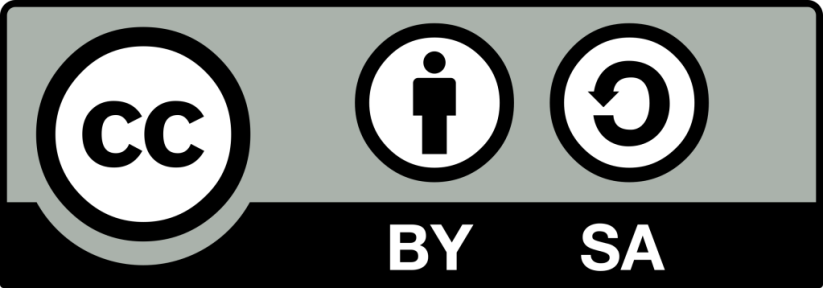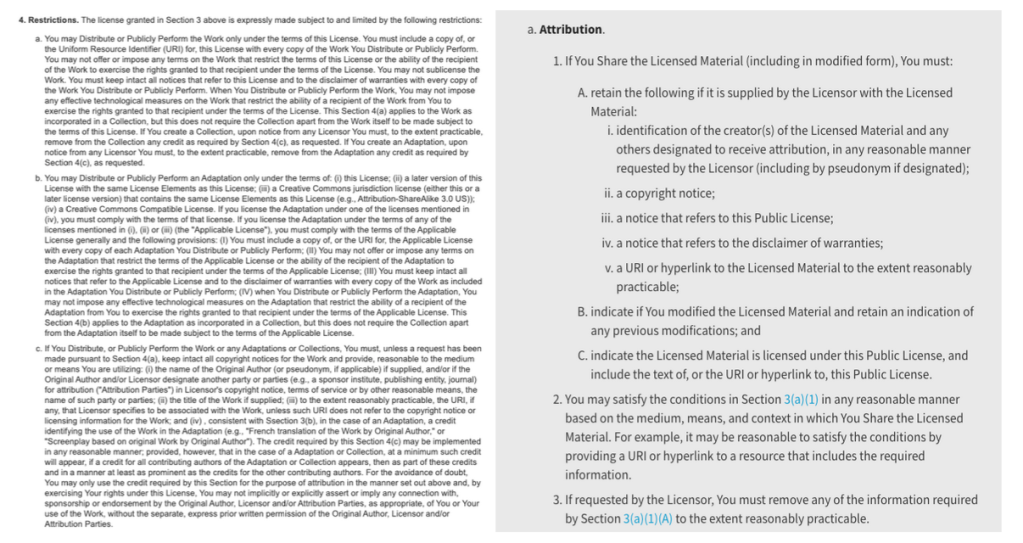The Wikimedia Foundation is excited to announce the update to our license to Creative Commons Attribution-ShareAlike 4.0, one of the main changes of our recent Terms of Use update, which brings the Wikimedia projects up to the latest version of the Creative Commons licenses.

We are glad to announce an exciting change that is now effective on many Wikimedia projects as part of our recent Terms of Use (ToU) update: Wikimedia project licensing has been updated from Creative Commons Attribution-ShareAlike 3.0 (CC BY-SA 3.0) to Creative Commons Attribution-ShareAlike 4.0 (CC BY-SA 4.0).
In this blog post, we’ll discuss what this update means to users and how it’ll positively impact the millions of volunteers who contribute to, reshare, and remix Wikipedia daily.
What are Creative Commons licenses, and why are they important to free knowledge and Wikimedia projects?
Creative Commons licenses are legal tools that enable everyone contributing to a massive, decentralized project like Wikipedia to create free culture content! Content that’s contributed to the Wikimedia projects under a Creative Commons license gives others permission to reuse and remix that content. That enables the projects to make knowledge available to people around the world, free of charge.
Creative Commons licensing allows creators—like Wikipedia editors—to retain copyright while permitting reusers—people who use Creative Commons content in their own works to help share knowledge—to copy, distribute, and republish the work in question as long as they follow two main conditions: The “Attribution” limitation means that a reuser must give credit to the original author; the “Share Alike” limitation means that reusers must share any adaptations they make under the same or an equivalent license. In this way, Creative Commons licenses enable knowledge to be widely adapted, help keep new knowledge freely available as people develop it, and contribute to making sure that the people who receive and use the knowledge in question are informed where that knowledge comes from so they can know its source and continue to contribute to it themselves.
Why did we update our license to CC BY-SA 4.0?
Wikipedia’s update to the CC BY-SA 4.0 license, from the previous CC BY-SA 3.0 license, helps to make the project more accessible, globally compatible, simplified, and readable.
1. New sources for knowledge
For years, new knowledge created under the 4.0 license could not be directly added to Wikipedia. Now it can! For example, United Nations (UN) bodies and national governments have licensed their publications under 4.0, and these did not match the older versions of the license. Now, publications such as those from the UN can be uploaded directly to the Wikimedia projects to provide sources, quotations, or descriptions in articles. This opens a large area of new material for the projects to work with and build on, and helps everyone move closer to the vision of making the world’s knowledge freely available for anyone, anywhere.
2. Internationalization
The 4.0 license has been designed to be a global license. With 3.0, there were multiple versions of the license, which varied depending on the country in which they were used. Now, with 4.0, the single license is applicable worldwide, with official translations in over 30 languages—and with many more to come! This eliminates the need for different ported versions of the license, that is to say, with changed language made for use in a specific jurisdiction. It also eliminates the need for users to make translations of those ports themselves. This universality fosters increased global collaboration across projects and national borders, hence making this change crucial to achieving the 2030 Wikimedia movement goals.
3. Attribution requirements are streamlined
With version 4.0, it is easier for reusers to understand how to credit the original author of the work. For example, it clarifies that linking to a webpage with attribution information is allowable, which is helpful since doing so has already become a common method of providing attribution. It also enables people to fix attribution mistakes within a reasonable time: this is important to help address simple mistakes without the need for overly aggressive copyright enforcement demands, and makes free knowledge content safer to use for people, anywhere in the world, who may be discovering and experimenting with contributing free content for the first time.
4. The license text itself is more readable
The side-by-side comparison of the licenses that we have provided below shows how the license language is now clearer to read. This is important because it helps people who contribute to projects like Wikipedia, as well as people who want to use information on Wikipedia in their own work, understand the license. Clearer, better-organized texts mean fewer attribution errors and broader use of this material for the public good.

You can find out more about what is new in 4.0 in this explainer from Creative Commons.
Conclusion
The update to CC BY-SA 4.0 will help the Wikimedia projects continue to thrive as open, collaborative platforms for sharing free knowledge. The update makes the projects’ content more adaptable and usable for the global community, makes large amounts of new material compatible with the Wikimedia projects, and aligns our platform with the latest standards in open licensing.
We are excited about this new chapter of more modern, flexible, and easy-to-use licensing of free knowledge. Volunteer editors have already started the process of updating the relevant policy documents on-wiki so that we can operationalize this change and better communicate it to volunteers across the various Wikimedia projects and languages. If you see a webpage with an out-of-date license version, please feel free to update it!

Can you help us translate this article?
In order for this article to reach as many people as possible we would like your help. Can you translate this article to get the message out?
Start translation